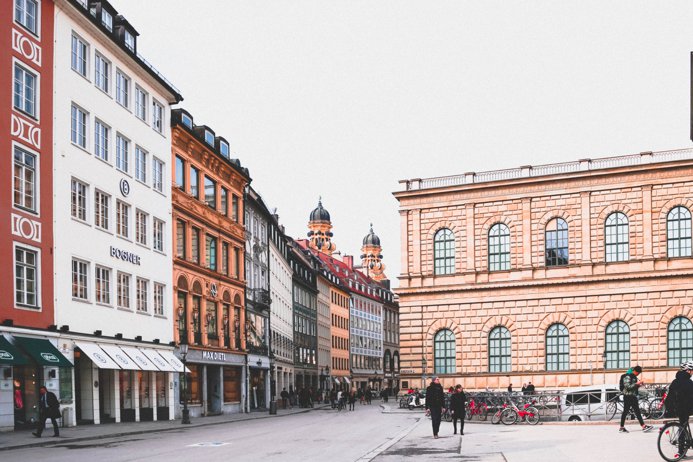German citizenship for investment … time and effort
 Germany is the largest and most stable economy in Europe. German passport offers visa-free access to 188 countries of the world. Germany ranks fourth in the list of the best countries in the life drawn up by the United Nations, and ten German universities are in the top hundred according to the Times Higher Education magazine. Therefore, many wealthy foreigners seek to obtain German citizenship. Can I get a German passport for investments in the economy of the country?
Germany is the largest and most stable economy in Europe. German passport offers visa-free access to 188 countries of the world. Germany ranks fourth in the list of the best countries in the life drawn up by the United Nations, and ten German universities are in the top hundred according to the Times Higher Education magazine. Therefore, many wealthy foreigners seek to obtain German citizenship. Can I get a German passport for investments in the economy of the country?
How to get German citizenship?
Germany does not offer foreigners a program of citizenship for investments, such as Cyprus (where an investor must buy a property worth 2 million euros). Naturalization is the only legal way to get a German passport. It implies the fulfillment of a number of conditions (for each of which, however, there are exceptions). To become a German citizen, you must:
to live legally in Germany for at least eight years;
speak German;
pass a test of knowledge of the legal and public order in Germany;
self-support financially;
have no previous convictions;
renounce first citizenship.
As an exception, Germany may grant citizenship at its discretion (Ermessenseinsbürgerung) for its special contribution to the development of the country Anastasia Dulgier / Unsplash
An important condition for obtaining a German passport is the refusal of the first citizenship. However, according to the head of the German consulting company Avers, Master of Law of the Free University of Berlin and Tranio partner Hermann Moyges, it can be circumvented if the recipient succeeds in proving that he will lose property or income as a result of giving up his first citizenship. when at home the applicant owns a certain category of land or a share in a company that foreigners are not entitled to own. ”
How to get a German residence permit?
There are different types of residence permits that allow foreigners (except EU citizens or the European Economic Area – they do not need a residence permit) to legally reside in Germany.
Temporary residence permit (Aufenthaltserlaubnis)
There are a number of reasons for obtaining a temporary residence permit:
education in Germany;
opening or acquiring a business in Germany;
international legal, political or humanitarian reasons;
family circumstances;
homecoming;
employment;
EU blue card (as a simplified form of obtaining a residence permit on the basis of employment for highly paid employees);
the presence of a permanent residence permit in another EU country;
And so on.
Experience shows that wealthy foreigners in most cases try to get a German residence permit through opening a business or receiving a blue card.
Opening or acquiring a business
Germany does not impose strict requirements for those who want to open their business in its territory. “There is no certain amount or number of jobs that would guarantee the applicant a residence permit,” comments Herman Moyzhes. “It is important to provide the German side with a believable, realistic business plan and prove that it is the applicant who has the necessary competencies to implement it.” The decision of the authorities may be influenced by the sector in which the applicant plans to open a company: the technology-related business is more likely to guarantee its owner a residence permit than a new hotel or restaurant. However, this path will bring the desired result only if the investor really wants and can do business in Germany.
As a general rule, a German residence permit does not grant the right to work in Germany, unless specified in the residence permit eabff / Depositphotos
Blue EU Card (Blaue Karte – EU)
A blue card is issued on the basis of an employment contract with an employer in Germany. Its recipient must have a higher education or similar qualifications that will allow him to perform this work. The minimum annual salary of a blue card holder must be 52 thousand euros. Unlike a residence permit obtained on the basis of a regular labor contract (that is, without qualification requirements and income level), the procedure for processing this document is easier and faster.
For professions especially in demand in Germany, the requirement for a minimum annual income can be reduced to 40 thousand. Lesniewski / Depositphotos
A blue card is issued for four years. If the owner of this type of residence permit for 33 months honestly carried out his work and paid contributions to the compulsory insurance fund, he receives an indefinite residence permit. For those who confirm the level of proficiency in German at level B1, this period is reduced to 21 months.
Some wealthy people are trying to get this type of residence permit, not planning to work in Germany: agree with the employer or create their own company in the country to enter into an employment contract. “Besides the fact that this is a fictitious scheme, it also turns out to be inconvenient and costly for the investor: he has to constantly pay social contributions and taxes.


